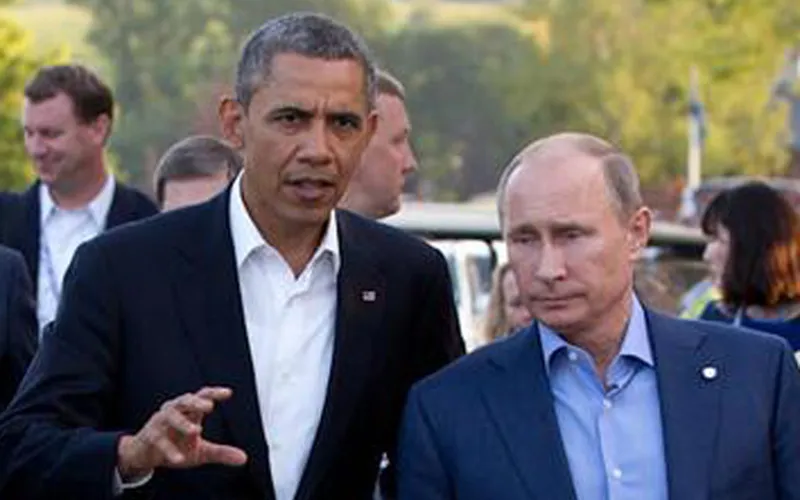As U.S. President Barrack Obama and Russian President Vladimir Putin meet in New York later on Monday, the issue of Syria has received fresh impetus. It is interesting that the two leaders are meeting on the sidelines of the United Nations General Assembly meeting since Moscow has always insisted on a UN centric approach to dealing with world issues.
Russia's military build up in Syria is heavily debated lately. The military build-up, seen mostly in Latakia and Tartus, has even led to speculation regarding the creation of an Alawite state in the event of Bashar al Assad's ouster from power.
Strategically, Syria is a key to Russia's position in the Middle East. Syria, on its part, has remained oscillated between Iran and Russia. Though the Syria-Russia alliance dates back to the 1970s, Assad began to rely militarily more on Tehran since the Syrian crisis unfolded in 2011.The support of Iran-backed Lebanese militant group Hezbollah played a key role in causing Syria's tilt towards Tehran. While Russia is aligned with Iran on Syria, the beefing up of its military presence in the region will help reinforce its independent influence over the Assad government.
Russian President Vladimir Putin has constantly reiterated the development of a powerful, effective Navy as one of Russia's chief priorities. The fall of the Assad regime to the ISIS or rebels opposed to them stokes Russian fears that this would mean losing Syria's port of Tartus, which is Russia's lone military outpost outside the former Soviet Union. More than anything, the port has symbolic value and remains important from the point of view of Russia's geopolitical influence in the region.
Meanwhile, the internal situation in Syria has been deteriorating rapidly. The opposition within the rebel groups themselves has intensified the situation even further. The Jabhat al-Nusra (affiliated to AlQaeda) and ISIS are fighting one another for supremacy while opposing Assad's regime. This inevitably has security concerns for Moscow who fears the radical Islamists'takeover of Syria.
Moscow's position also reflects its opposition to Western-sponsored regime change policies. The Kremlin's view is that the U.S. invasion of Iraq in 2003 and the West's handling of the Libyan crisis in 2011 have resulted in chaos in these countries with no viable institutions coming up to effectively replace those developed by the previous regimes. Opposed to regime change with outside help, Moscow does not want Assad to meet the same fate as the leaders of Iraq and Libya. While Putin may not have any soft feelings for Assad, his ouster, without a political succession plan in place, could significantly affect Russian interests in the region. This inevitably raises apprehensions in the Kremlin.
For example, after the fall of Saddam Hussein in 2003, Russian companies lost their stakes in the Iraqi energy sector, and it took them a long time to make even a marginal return. Moscow had to incur losses amounting to approximately $4 billion by losing weapons contracts when the Libyan regime fell. Russia wants to avoid a similar situation with respect to Syria.
Though not as strong as strategic concerns, Moscow also has commercial interests in Syria, particularly in the arms trade, which could be affected adversely if Assad were to be overthrown. Historically, the trade balance has been in favour of Russia, making Syria an appealing market for Russian companies. In 2005, Moscow forgave about three quarters of Syria's debt in exchange for new contracts for Russian businesses. This has led to a substantial increase in Russian investment in the economy of the country in energy and infrastructure projects.
Russia is also interested in Syria's supposed offshore oil and gas reserves. Russia's Soyuzneftegaz signed an agreement with the Syrian Ministry of Oil and Mineral Resources on exploration and preliminary drilling in an area off the Syrian coast on 25 December, 2013. The approximate cost of the twenty- five-year contract is almost $100 million.
Although Moscow has various interests in Syria, the issue of radical Islamism remains its fundamental concern. Having fought the two Chechen wars, it would not want another conflict to erupt on its territory. If either the ISIS or the rebels succeed in overthrowing Assad, there is a huge likelihood of expansion of jihadist activity and consequent instability to the Caucasus and southern Russia.
Therefore, the issue, as Matthew D. Crosston puts it "is not that Russia finds Assad superior; simply, the status quo seems less chaotic and dangerous to Russian interests".
Thus, the common threat of ISIS between the West and Russia can play a crucial role in resolving the situation in Syria. The West-Russia collaboration could prove crucial in curbing the violence in the conflict stricken country. Irrespective of their differences about regime change in Syria, neither wants the spread of ISIS.
In this context, the NATO Chief Jens Stoltenberg's statement on 27 September calling for "co-ordination" with Russia to prevent "incident or accident" suggests that the West is now inclined to seek a political resolution to the Syrian crisis without predicating it on Assad's overthrow.
(The writer is a Research Assistant at Observer Research Foundation, Delhi)
The views expressed above belong to the author(s). ORF research and analyses now available on Telegram! Click here to access our curated content — blogs, longforms and interviews.




 PREV
PREV


